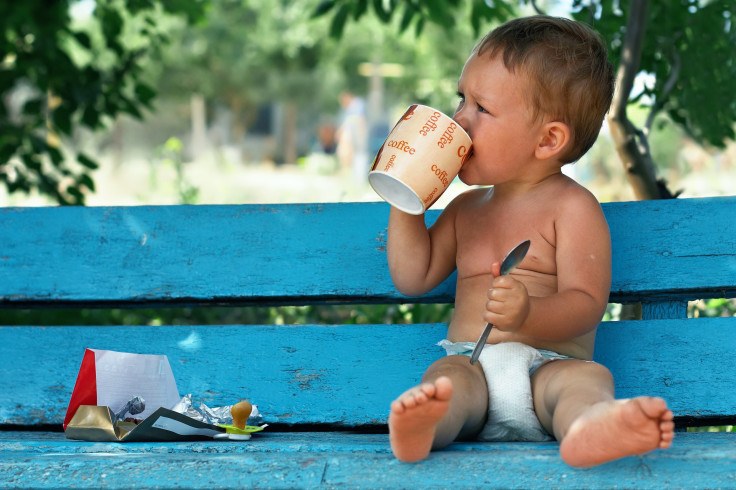Coffee Consumption Among Toddlers Worries Experts: The Dangers Of Baby's First Latte

Breastfeeding and coffee don’t mix for the sake of a baby’s health, but for the first time researchers have discovered a culture that’s actually pouring coffee into their babies’ sippy cups each day. Boston researchers from Boston Medical Center’s Division of General Pediatrics exposed mothers who have turned their toddlers into little coffee drinkers, and published their findings in the Journal of Human Lactation.
“Coffee consumption is not uncommon among toddlers in Boston, Massachusetts,” the study’s authors wrote. The team of researchers studied 300 Bostonian mothers and found 48 of them were feeding their 2-year-olds coffee on a daily basis. Pregnant moms are faced with a long list of potentially harmful foods and liquids for their newborns, and also what they have to avoid during breastfeeding so they don’t transfer it to their baby through milk. However, there’s been no known research examining the prevalence of coffee consumption on America’s youngest citizens — toddlers.
The mothers in the study don’t represent the average American mom — 80 percent of them were Hispanic. Among coffee consumers, 67 percent of Hispanics drink coffee regularly, which is more than any other ethnic group in the United States, according to the National Coffee Association. It’s not unheard of in their culture, too, for the children to enjoy a cup of coffee with their parents. Despite familial norms, the cardiovascular effects caffeine can have on a little heart may not be worth the risk.
“I think there is no place for caffeine in a child’s diet until they become young adults, at age 18,” Jessica Lieb, a registered dietician at the Children’s Hospital of Pittsburgh of the University of Pittsburgh Medical Center, who wasn’t involved in the study, told Today Health. “And even in adults, it’s important to be really careful. As in all things, caffeine should be consumed in moderation.”
Beyond the caffeine, coffee also has bad ties to the childhood obesity crisis in America. Babies and toddlers need high density nutrients, such as vitamins A and C, potassium, fiber, protein, and calcium. Coffee doesn’t deliver enough of vitamins or minerals and actually interferes with their iron absorption, causing a risk for early-childhood anemia. Previous research has also found coffee and tea consumption among 2-year-olds triples the risk of a child becoming obese by the time he's enrolled in kindergarten. Coffee is addictive, and it usually pairs with creamers and sugar blends, which children are consuming in one big calorie concoction.
Source: Burnham L, Merewood A, Knapp BP, Braun N, Makrigiorgos G, and Matlak S. Breastfeeding and Coffee Consumption in Children Younger than 2 Years in Boston, Massachusetts, USA. Journal of Human Lactation. 2015.



























